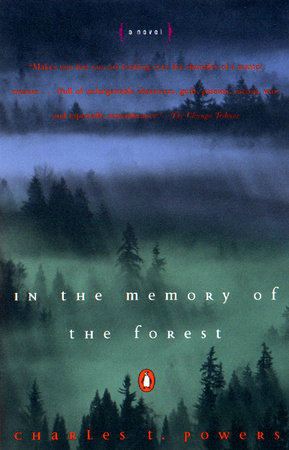In the Memory of the Forest Reader’s Guide
By Charles Powers


INTRODUCTION
In the Memory of the Forest opens with a mystery—the murder of Tomek Powierza. And when his friend, Leszek, decides to find out who killed Tomek, he touches off a wave of secrecy, corruption, betrayal, and shame that envelops the entire small Polish town of Jadowia. But this is not your typical murder mystery, self-consciously plotted to incorporate the stylized images we find in genre novels. From the town’s puffed-up apparatchiks to its determined priests, from its rugged farmers to the workers who doggedly operate the town distillery, Powers tells the stories of simple people struggling to survive in a singulary unglamorous and decidedly unjust world. Their hardscrabble lives offer little in the way of excitement, but they are witnessing a momentous revolution. And as easy as it would be to bury Tomek without asking questions, so it would be easy to forget that a once-thriving community was decimated in a heartbeat. The murder of one young man is overshadowed by the atrocities that came before him—the murder of millions of their countrymen during the Holocaust.
Charles T. Powers has set his haunting novel in Poland—a country that has been wracked by war, government upheaval, economic devastation, and ethnic persecution for most of its existence. Although the history of its people stretches back a millennium, Poland has not been recognized as an independent country for more than a tenth of that time, its barriers having shifted widely to the east and west as neighboring forces annexed, partitioned, and occupied its fields and deep forests. When we meet Leszek, Poland is recovering from yet another upheaval—the defeat of Communism. The dismantling of the country’s dense and intricately structured bureaucracy has hit Jadowia particularly hard. The economy is in a turmoil, as is the town’s power structure. Powers’s decision to set his novel in a small farming town is also significant. Most of Poland’s political dramas were played out in the cities, between the workers and the government. The majority of Poland’s farms were individually owned, and so the inhabitants of towns such as Jadowia did not figure prominently in the overthrow of the Communist government. But they have suffered nonetheless. In Powers’s brilliantly structured and sensitive portrayal of a town and its people, this small, unremarkable village becomes a place where the major themes of Poland’s recent history intersect.
The forest holds the answer to many of the town’s mysteries. But it is a silent witness, and it is up to the people of Jadowia to seek out and proclaim the truth for themselves. Fortunately, there are those who choose to do so—Leszek’s grandfather, Father Tadeusz, Staszek Powierza, and Czarnek—and it is their stories of courage and determination that make this novel a compelling and important reminder that we have a responsibility to the past, to the future, and to each other.
A time line of historical twentieth century events in Poland to enrich your reading of In the Memory of the Forest:
World War I 1914-1918
Poland is taken by Austro-German armies.
November 1918
Poland declares its independence.
September 1939
Germany and the USSR invade Poland, dividing the nation.
World War II 1939-1945
Under Nazi rule, six million Polish citizens, many of them Jews, are murdered.
1947
Communists sweep national elections. Under the shadow of the Soviet Union, industries are nationalized, production on farms drops.
June-August 1980
Labor strife brings the country to its knees, before the government grants concessions to striking workers. Workers earn the right to form unions and the right to strike.
December 1981
Solidarity leaders propose a nationwide referendum that would establish a non-Communist government if the current government did not accept a series of labor demands. The government in turn imposes martial law, and the union leaders, including Lech Walesa, are jailed.
December 1982
Martial law is lifted.
April 1989
The government reaches a historic accord with opposition factions on a number of reforms, including free elections.
June 1989
In free elections, candidates with the backing of Solidarity are clear winners.
December 1990
Lech Walesa becomes president of Poland.
A native of Missouri, Charles T. Powers (1943-1996) started his career writing for The Kansas City Star. A former Niemen fellow at Harvard University, he spent twenty years as a journalist for the Los Angeles Times, twelve of those as a correspondent in Africa. Powers served as the newspaper’s Eastern European Bureau chief in Warsaw from 1986 to 1991, where he fully immersed himself in Polish culture. For the last five years of his life, he lived in Bennington, Vermont, where he completed In the Memory of the Forest, his only book.
“An elegantly plotted novel that takes you deep into the woods of Eastern European misery and builds to a cinematic conflagration that illuminates the heavens and turns suffering into art.”
—Mirabella
“A wonderful book, beautifully written and gripping from the first pages. I couldn’t put it down.”
—Bill Bryson
“In this vivid novel of memory, loss and restitution, Charles T. Powers takes us into the heart of Eastern European darkness. . . . In the Memory of the Forest is a work of huge emotional and historical archaeology— a beautiful book that will still find grateful readers decades from now.”
—Jay Parini
“A rich and largely satisfying novel. . . . Skillfully written.”
—The Boston Globe
“A fiercely lyrical tale . . . moving and intense.”
—Publishers Weekly
Just for joining you’ll get personalized recommendations on your dashboard daily and features only for members.
Find Out More Join Now Sign In